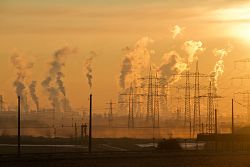

Campaigners have warned "tone-deaf" expansion of fossil gas is accelerating climate breakdown and increasing reliance on hostile regimes.
According to analysis from the campaign group Beyond Fossil Fuels, just four of Europe's gas-fired power plants have a retirement plan, and new projects will increase the continent's gas generation capacity by 27%.
Beyond Fossil Fuels argues that the dash for gas contradicts the International Energy Agency's recommendation that rich countries decarbonise their electricity grids in the next 10 years to stop the planet from heating to 1.5c.
Alexandru Mustață, Campaigner at Beyond Fossil Fuels, said governments must send a clear message to the gas industry that its days are numbered as: "This undermines our security, exposes us to volatile power prices and toxic emissions, and heightens the risk of stranded assets".
Campaigners used data from Global Energy Monitor to map Europe's gas-fired power plants and found a planned retirement date had been set for just 2% of the continent's capacity.
The analysis found that Italy, the UK and Germany had the greatest planned installed capacity to make electricity from fossil gas, which is a fuel that is cleaner than coal but still pumps planet-heating pollutants into the air when it is extracted and burned. The three countries agreed to "fully or predominantly" decarbonise their power sectors by 2035 at a meeting of G7 climate and energy ministers last year.
Although about one-third of the planned power plants are also used to generate heat, which is harder to provide cleanly than electricity, the rest of the projects are just for power or do not specify.
Beatrice Petrovich, Analyst at climate thinktank Ember, said its modelling of energy transition pathways showed that fossil gas would pay a "diminishing role" in the European power generation mix.
She added: "Investment in renewables, grids and clean flexibility today is not just good for mitigating the dangerous increase in temperatures, but will cut bills for consumers and reduce the risk of price spikes connected with a volatile global gas market".
European governments have rushed to build fossil gas infrastructure since Russia invaded Ukraine and sent gas prices soaring, even as they have pushed to phase out fossil fuels on the global stage. The projects underway and in planning range from:
Dr Chris Bataille, an Author of the latest Intergovernmental Panel on Climate Change (IPCC) report on climate solutions who is a Researcher at Columbia University's Center on Global Energy Policy, said he thought the new gas plants could play a role in a decarbonised energy system but "you’re heading to a point by 2035-40 where you’re just keeping that fleet around emergencies".
He did not expect many of the projects to become stranded assets, he added, because a gas plant pays for itself in about ten years.
He added that the big worry for the climate is where the gas comes from: "There is a concern with getting stuck on gas that’s high in fugitive emissions. But if you’re being preferential with your buying, it’s a temporary thing you’re planning to shut down once you’ve got enough wind, solar and batteries, I don’t see it as much of a concern".
The IPCC found in 2022 that the emissions from planned and existing "unabated" fossil fuel infrastructure were enough to blow through the carbon budget for 1.5c. The oil and gas industry has promoted technologies to capture carbon and store it (CCS) as a way to extend the lifetime of its assets instead of replacing them with cleaner sources of energy.
Although experts see carbon capture as a promising way to clean up some dirty industries such as cement-making, they are sceptical about it playing a useful role in generating electricity, even to complement renewable energy at times when the sun is not shining and the wind is not blowing.
Bataille also added that the extra capital costs of capturing carbon from a gas plant as so high that to make it worth it, you have to run it all the time: "You can't use it as a following unit to balance wind and solar".
He added that while it "might be legitimate" to use fossil gas with carbon capture in places with no alternative sources of clean firm power, advances in battery technology were making it less likely.
"The case for fossil CCS in power keeps getting smaller and smaller".